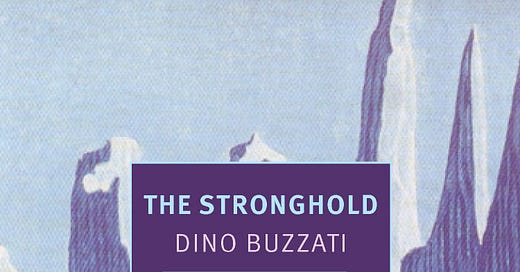This post is the fifth instalment of a course I’m currently running for paid subscribers called How to Read and Analyse a Novel—we have now moved on to reading and discussing individual books! For full introductory details and the reading list, start here, there’s still time to catch up. You can adjust your notification settings here if you would like to opt out of these emails.
The wonderful thing about taking on a project like this one is having an excuse to re-read books. And even better, to re-read them in that highly attuned way you do when you analyse a novel. Whilst I liked The Stronghold (also known as The Tartar Steppe) upon first read, this time I really loved it.
What has changed in the interim? I have a couple hundred more books under my belt, and a couple more years of reading closely, which certainly helps. The first time, the experience was made infinitely better by reading it with others through a buddy read we ran at the time through book club—in fact it is one of the most memorable buddy reads I’ve done!—and so I had the benefit of those conversations percolating in my mind already. I had a sense of what was already there, and I could look closer at how the book works, and why it works.
I won’t go too much into the benefits of re-reading now, lest we get entirely off topic. But in short, I’ve been guilty of feeling a re-read is pointless when there are so many books out there and I could be trying something entirely new. But every time I re-read a book, I find it an incredibly rewarding experience. I’m of the mind now that a book can’t be a true favourite until you’ve read it at least twice! And I’m perhaps now eyeing up some books I liked the first time around but wasn’t enamoured with… judging by my experience with this book, I’m wondering if I should make time for them, too!
For the purposes of this course, though, we can get the benefits of re-reading on the smaller scale. I have found myself in the last week or so reading and re-reading individual passages a lot more (not just twice, but four, five times) and it’s been really beneficial. You may do this naturally, but I don’t often really take my time with an individual passage or chapter these days unless I’m reading for a project like this one or for book club. But it’s amazing how something so simple can enhance your understanding so much!
Back to The Stronghold. This time it struck me as truly masterful. Although it is in theory a book in which nothing much happens, in truth a great deal happens here. We witness the entirety of a man’s adulthood, and that is no small thing.

Summary
First of all, thank you so much to everyone that did read this one with us, and also thank you to anyone who has contributed comments to the thread I opened last week! Please feel free to add more comments in the comments section below today, or continue using the chat thread, if you prefer. These will stay live, so even if you are seeing this in a few weeks or months time, I know that I, at least, would love to hear your thoughts.
For those that haven’t read this book or don’t intend to but would still like to read today’s post, here is a brief overview.
In the novel we follow Giovanni Drogo, a newly commissioned military officer who has been assigned to the mysterious Fort Bastiani for his first posting. The time period and exact location of the fort is deliberately fuzzy, and it has a surreal and mystifying feel from the start. This is characteristic of Buzzati’s work, as he eschewed realism for a more illusory and fantastic style. Drogo recognises almost immediately that there is something uncanny about this place; it is far from “the city” and cut off from society, and yet many of the soldiers there seem never to leave or even want to leave, whiling away many years of their lives. I don’t think it’s too much of a spoiler to say that Drogo becomes one of these men, and we follow him as the time allotted to him seems to slip through his fingers in this strange, quiet place.
Much of the feel of the fort seems to be down to the fact of it looking out across a vast empty desert. The men there are supposedly guarding a border, but there appears to be no threat whatsoever coming from the north, and they spend day after day looking out into this desolate landscape. As time goes on, they fill it with their own fantasies and dreams, hoping that if they just wait a little longer, something might materialise down there.
Buzzati was an Italian writer living in the twentieth century. He worked as a journalist for most of his life, but also produced works of fiction like this one. This particular novel was written and published on the eve of World War II, which Italy joined in 1940 as one of the fascist Axis powers.
Translation
Before we get into considering how time functions in the novel, I wanted to talk about translation. I’ve now read both; the first time I read it I read Stuart Hood’s, and this time I read Lawrence Venuti’s which is new for the NYRB edition, published in 2023.





